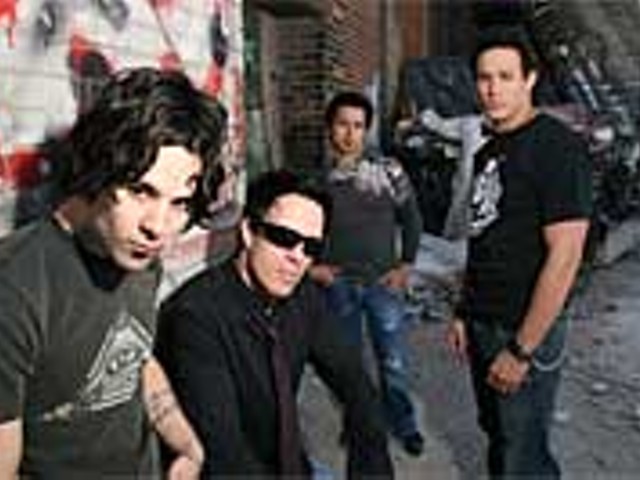It's not news to report that Detroit musicians are often bigger abroad than they are at home. But for Franki Juncaj and Maurice Herd — also known as DJ 3000 and Pirahnahead — status is all relative. They're two guys born a few months apart in 1972, one white and one black, who grew up in different corners of the city. But while the DJs' musical styles are as different as their backgrounds, what they share is the drive to deliver something "universal."
"I want to change all that shit about racial differences, and the arrogance people have about 'my music being better than your music,'" says Herd, who grew up between Jefferson and Kercheval on Detroit's lower east side. "I do it with music and I do it with love. I'm about building bridges and meeting you in the middle."
Juncaj finds inspiration in his Albanian heritage, and the tight-knit Hamtramck household in which he grew up. "It's a lot of personal stuff that helped me get deeper into my own production," he says. "I talked to my aunts and uncles about the music that came from their village in Yugoslavia. I was exposed to some amazing shit that really hit me hard. My family helped me grow into my music."
DJ 3000 and Pirahnahead each represent Detroit the city, with its intersecting social, cultural, economic, ethnic and racial identities. But they also represent Detroit as the musical incubator, ground zero for a sound that perks the ears of kids in Tokyo and Düsseldorf.
Why the far-flung locales, and not necessarily local listeners? That's a mystery Juncaj hasn't figured out, but he's not dwelling on it, either. "There is something about Detroit that reaches people all over the world, but it's not something you can easily put your finger on," he says. "The sound is evolving and always getting influenced by different styles. For me, it's not just techno or electro, but hip hop, atmospheric and down-tempo shit that keeps the music going forward."
DJ 3000 released the mix-CDs True Colors and Perseverance on Submerge, and has original tracks and remixes on the famed techno label. But he also started his own imprint, Motech, to showcase his explorations into ethnic techno, and the melding of Balkan and Middle Eastern percussion with an electronic headcharge that's purely Detroit. On Migration, his first full-length of his own material, techno beats smack against North African rhythms, and wicked basslines growl beneath samples of traditional string instruments. "Sangita" recalls the global new wave sounds of early-'80s Talking Heads; the single "Ancestors" is a multi-layered tribal stomp with haunting female vocals; and "Stand Alone" has a hardcore electro-disco bounce that might fit into an electronic body music or dark wave set in Belgium or Holland.
"Some of what I do sounds like world music with fucked-up beats," Juncaj says. "People don't even have to know it's from Detroit."
Juncaj, who's touring Japan and Europe this spring and summer, says he has no better label for his music than this: "As long it's funky, I don't care what you call it. People get stuck on always calling music something that they're familiar with. The hell with all that. If it's good music, dial in and dance to it. It shouldn't be that hard."
Like Juncaj, family is a key to understanding where Pirahnahead's music comes from.
Born into a family of Jehovah's Witnesses, Herd says he grew up thinking that evil could be wiped out forever and that paradise on earth was attainable "by knocking on people's doors." But as a boy he also discovered Parliament-Funkadelic, and that was a different kind of religious experience.
"That was it, man," he says, relating the story of Parliament's 1977 concert at Cobo Arena. "It set me off in this direction, and I ain't never went back."
By the age of 9, Herd had enough records to DJ street parties on his block, and by his teens he was sneaking into house parties at the old Bookies club on West McNichols, Heaven on Woodward and downtown at Studio 54. He picked up a guitar and joined Charm Farm in the late '80s, and played with Enemy Squad in the 1990s, when his bandmate the Blackman dubbed him Pirahnahead. Since then he's been developing a sound that blends house with techno and soul.
"I saw Ken Collier and Iggy Pop back to back," Herd says of the late Detroit house DJ and the godfather of punk. "I was into the dance and rock, man. I loved Kiss and Bernie Worrell, Sly & Robbie and Generation X with Billy Idol. What's the common thread between all that shit? It's all about music trying to change the world, which is what I'm about."
On the new LP Solid: A Moment in the Mind of Pirahnahead (Mahogani Music), Herd journeys through his personal history, referencing his mother ("Mama's Pen") and late father ("Daddy's Message"). On "Shishilala (New Year's Reprise)," soaring fuzz guitar and organ solos recall his heroes in P-Funk. It's a powerful record that reveals influences like the deep house of Kenny Dixon Jr., aka Moodymann, but also the echoes of his childhood. "I always keep on pushing," Pirahnahead says, "Trying to make something that will last forever."
Or at the very least make people move, no matter where they're from.
DJ 3000 will play a DJ set Saturday, June 24, at a release party for Migration. The party is at the Majestic Café, 4140 Woodward Ave., Detroit. 10 p.m. Free.
Walter Wasacz is a freelance writer. Send comments to [email protected]




